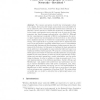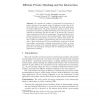102 search results - page 13 / 21 » Perfectly Secure Multiparty Computation and the Computationa... |
108
click to vote
ESAS
2004
Springer
15 years 5 months ago
2004
Springer
The common perception of public key cryptography is that it is complex, slow and power hungry, and as such not at all suitable for use in ultra-low power environments like wireless...
EUROCRYPT
2004
Springer
15 years 3 months ago
2004
Springer
We consider the problem of computing the intersection of private datasets of two parties, where the datasets contain lists of elements taken from a large domain. This problem has m...
CORR
2010
Springer
14 years 11 months ago
2010
Springer
The non-repudiation as an essential requirement of many applications can be provided by the asymmetric key model. With the evolution of new applications such as mobile commerce, it...
91
Voted
TCC
2005
Springer
15 years 5 months ago
2005
Springer
In this work, relations between the security notions standard simulatability and universal simulatability for cryptographic protocols are investigated. A simulatability-based notio...
AINA
2007
IEEE
15 years 6 months ago
2007
IEEE
We propose a four-party password authenticated interdomain key exchange protocol which makes use of properties of identity-based cryptography and secret public keys. Being passwor...



